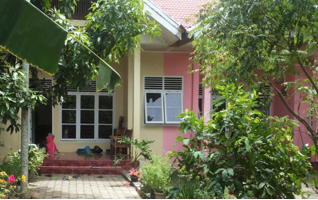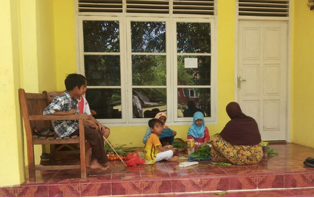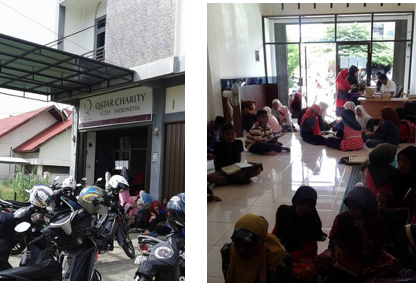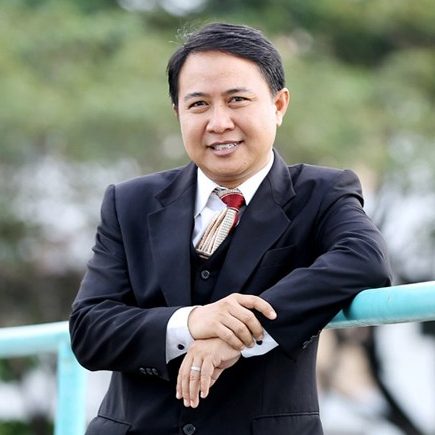Hilman Latief: Preserving Gulf Charities: Orphans Projects in Post-Disaster Aceh
This essay discusses the nature of charity networks between Southeast Asia and the Middle East by examining projects run by Gulf charities for orphans in Aceh in the aftermath of the tsunami disaster of 2004. While there were extensive development and reconstruction projects funded by foreign non-governmental organisations (NGOs) to normalise the social, economic, and political lives of the people of Aceh, some NGOs from the United Arab Emirates, Qatar and Saudi Arabia specifically paid attention to helping orphans, apart from working on construction and rehabilitation projects. These aid programmes for the “tsunami orphans” of Aceh continued for more than 10 years after the tsunami disaster, longer than other development programmes managed by foreign NGOs. This essay seeks to discern the rationale behind the extensive roles played by Gulf charities in aiding tsunami orphans; how the tsunami projects and the presence of Gulf charities have been preserved in Aceh; and what roles Indonesian NGOs/social activists are playing in the process of localising these Gulf charities in Indonesia’s social and political landscape.
Orphans have a special place in Muslim society as well as in Islamic narratives. The Qur’an and hadith (prophetic tradition) urge the believers (Muslims) to look after orphans and feed the poor, cautioning them that Muslim prayers carry no meaning if they abuse and mistreat orphans and the poor (Qur’an 107: 1–7). Inspired by the Quranic verses and prophetic narratives, Muslim charitable organisations have seen orphans as one of the most deserved categories of beneficiaries. It is common for benefactors and zakat(alms) payers to channel their giving directly to orphans, including those living in orphanages. Muhammadiyah, Indonesia’s largest and oldest modernist Muslim organisation, for example, has built no fewer than 300 orphanages throughout Indonesia since its inception in 1912. According to the Indonesian Ministry of Social Welfare, there are approximately 8,000 orphanages in the country operated and aided by both government and civil society organisations.
In Aceh, the number of orphans understandably increased after the tsunami. With more than 100,000 people reported to have died after the tsunami, thousands of children lost their parents. Some of them might have lived as refugees or street children, or might even have been trapped in human trafficking.[1] The large number of orphans in Aceh after the tsunami drew the attention of NGOs, particularly those from the Gulf countries. These included charities such as Qatar Charity and Kinderhut. In 2005–2006, when Aceh was still in the state of recovery and rehabilitation, the Indonesian government, represented either by the Ministry of Foreign Affairs or the Ministry of Religious Affairs, established partnerships with several NGOs from the Gulf countries to address various issues in Aceh, including the provision of aid for orphans and vulnerable children.
The involvement of international Islamic charities in helping children and orphans in Muslim countries or areas where Muslim communities are affected by disaster reflects how religious motivation has influenced their patterns of humanitarian understanding and practices.[2] In Indonesia, almost all Islamic charities whose agendas, among other things, include collecting and disbursing zakat and sadaqa (voluntary giving) have targeted children and orphans as their main beneficiaries, besides helping other vulnerable groups such as the elderly and women. Thousands of orphanages operating in many regions of Indonesia, in fact, are also supported partly by zakat and sadaqa from Muslim benefactors.
The inclusion of orphans in humanitarian projects in disaster spots seems to have provided broader opportunities for Islamic charities from the Gulf countries to maintain their long-term projects and partnerships with Indonesian NGOs. Catering meaningfully for poor children and orphans involves helping them to overcome their limited access to education. In this respect, the orphans projects run by Gulf charities in post-disaster Aceh are basically about the provision of education for underprivileged groups.[3]
How are Charity Networks Preserved?
Indonesians have shown warm reception towards Gulf charities. This is partly evidenced by the wide range of partnerships between Islamic foundations in Indonesia and charitable organisations from the Middle East, either for da’wa (the call to Islam) or Islamic education projects. In Aceh and other regions of Indonesia, Gulf charities have been able to manage their programmes with the support of local volunteers and professionals. The partnerships between Indonesian NGOs and Gulf charities intensified and expanded through humanitarian work in Aceh. Just like other international Muslim NGOs operating in Aceh, such as the UK-based charities Muslim Aid and Islamic Relief, it appears that Qatar Charity and OIC Alliance (a special programme established by the Organisation of Islamic Cooperation to rescue child victims of the tsunami) have enjoyed what Jonathan Benthall has called “a privileged relationship”, thanks to the “cultural proximity” (including cultural and religious affiliation) between Gulf charities and the people of Aceh. Benthall argues that “cultural proximity” between Muslim NGOs and Indonesian Muslims, both individuals and organisation, “has been a factor in making access possible and, to some extent, in smoothing the way for good working relationships.”[4]
Qatar Charity is one of the leading Gulf charities operating in Indonesia. It has operated in different regions of Indonesia and cooperated with many local Islamic foundations working on da’wa, education, and welfare. Therefore, hundreds of Islamic foundations in Indonesia have enjoyed Qatar Charity’s support in the establishment of mosques, Islamic schools, pesantren (Islamic boarding schools in Indonesia), and orphanages. As of 2017, Qatar Charity had partnerships with 170 Indonesian Islamic foundations and had established 6,000 programmes on education, health, mosque reconstruction and humanitarian relief.[5] Within ten years (2006–2016), Qatar Charity had provided educational funding for 950 children.
Likewise, OIC Alliance has played an instrumental role in deepening relations between Indonesian Muslim foundations and donors from the Gulf region, both individuals and institutions. OIC Alliance seemed to have a larger orphans project compared with those run by other NGOs operating in Aceh in the immediate aftermath of the tsunami. As a kind of consortium, OIC Alliance has channelled a large amount of money to support orphans under the framework of the “OIC Alliance Orphans Kafala” or “Child Victims of Tsunami” project. King Abdullah ibn ‘Abdul Aziz of Saudi Arabia was the largest donor in the early years of this project and OIC Alliance has committed itself to catering for 25,000 orphans until 2021.[6] In the early post-tsunami period, OIC Alliance successfully raised up to US$1.3 billion, while Saudi Arabia provided US$1.5 million for office expenses for the programme. OIC Alliance claimed in 2015 that, as part and parcel of its humanitarian mission, some 13,000 Indonesian orphans had been aided since 2006, and 5,300 of them were still receiving scholarships.[7] In the first years of its presence in Aceh, OIC Alliance was directly managed by its representative from its central board. But later it was left to professional Acehnese to manage its work in Indonesia, and a lecturer from the State Institute of Islamic Studies (IAIN Ar-Raniry), who had graduated from the Middle East, spoke Arabic fluently and was knowledgeable about Aceh, took over its running.
In short, Gulf charities were not alone in running their Aceh projects. Their projects were practically supported and supervised by local Muslim charitable organisations, such as Pos Keadilan Peduli Umat (PKPU), the Indonesian Red Crescent Society (BSMI) and Rumah Zakat. These local Muslim NGOs have played an instrumental role in designing and executing the orphans projects. Most of them, in fact, have the capacity to work autonomously, using their own funds raised from Indonesian donors. Rumah Zakat, for example, is one of Indonesia’s largest zakat collectors and is managed by professionals and skillful volunteers, while PKPU is the largest and most active Muslim humanitarian NGO in Indonesia, acting as both humanitarian organisation and zakat collector.[8] These Indonesian NGOs have been able to establish strategic partnerships for running social projects with national and multinational companies as well as foreign NGOs. They often act like sub-contractors of foreign NGOs in the provision of aid. Their experience in managing welfare-oriented projects in Aceh was helpful to the Gulf charities in running rehabilitation and development programmes, including the orphans projects. For instance, local NGOs partnering with OIC Alliance have had the technical experience and expertise to act as aid providers, data suppliers, and evaluators, while the OIC Alliance staff functioned as general assessors or programme advisers.
Kinderhut International, an NGO founded by medical doctors and volunteers from Dubai after they had worked as volunteers in the disaster area, is another organisation from the Gulf region that has provided assistance to Indonesian orphans. Kinderhut International, with its tagline, “a bond beyond barriers”, has been involved in charity and humanitarian projects in countries such as Jordan and India, apart from Indonesia. The way Kinderhut manages its orphans project is different from Qatar Charity and OIC Alliance’s approaches. In Aceh Besar, it has established “Kinderhut Villages” comprising 14 residential units to house 103 children and destitute women. Unlike OIC and Qatar Charity, which prefer using foster parents to run orphans projects, Kinderhut has sent an executive director to directly manage Kinderhut Village, which has functioned like an orphanage. The director of Kinderhut is a young activist from India who was working in other NGOs in India on child issues before his appointment in Aceh Besar.[9]Although professional workers appointed in the Kinderhut office in Aceh originated from India, the central office of Kinderhut International in Dubai is under the supervision of the International Humanitarian City of Dubai, in which a number of leading figures from the United Arab Emirates are involved. Kinderhut is a part of Dubai ruler Mohammed bin Rashid al-Maktoum’s Global Initiatives, chaired by Princess Hayya bint Al Hussein.

Figure 1. One of the homes in the Kinderhut Village orphanage. (Photo courtesy of author.)

Figure 2. Childen with their foster parents in Kinderhut Village.
It should be noted that local NGOs working in Aceh that have collaborated with Gulf charities are managed by professionals recruited specifically to work for tsunami relief. Most of them are Acehnese, while others are volunteers and professionals from other regions of Indonesia, such as Medan and Jakarta.
The involvement of local volunteers and NGOs in running the orphans projects of Gulf charities has been critical in reducing bureaucratic barriers on the field and avoiding cultural misunderstanding with the local communities in Aceh. Some Gulf charities, just like other foreign charities (e.g., World Vision and its Wahana Visi Indonesia), have metamorphosed into local foundations, which means they are registered locally and act in some respects like local NGOs, run by local volunteers and professionals, despite the fact that they obtain financial support from foreign NGOs. For example, Qatar Charity has become an Indonesian foundation, namely Qatar Charity Indonesia (QCI), registered with the Ministry of Interior, although it still relies on Qatari donors for its financial resources. In Aceh, Qatar Charity Indonesia is directly involved in managing its orphans projects, and its activities are supported by local volunteers and professionals, whose role is to manage the office and run programmes as well as to serve as a link between the orphans and Qataris donors.

Figure 3 (left). Mothers and foster mothers of orphans waiting for their children outside the Qatar Charity Indonesia (QCI) Office in Banda Aceh. (Photo courtesy of author.)
Figure 4 (right). Orphans and recipients of QCI scholarships reciting the Qur’an in the QCI office hall, guided by volunteers. (Photo courtesy of author.)
Religious Impact?
Charity is not always about humanitarianism but a part of religiously motivated social expression, mission and duties; the narratives developed by Gulf charities involved in the orphans projects in Indonesia cannot be detached from Islamic narratives. The Gulf charities did run various religious activities in the framework of their orphans projects. For example, in order to maintain and intensify communication with the orphans, they frequently invited the orphans to attend Islamic study groups (pengajian) or Quranic recitation exercises. Also, some orphans were funded to perform the ‘umrah (minor pilgrimage to Makkah). Nonetheless, there was no obligation on the part of the orphans to study in Islamic schools. In fact, many of the orphans supported by Gulf charities studied in public schools and even public universities and majored in various secular subjects.
Although the ties between the Gulf charities and local NGOs that partnered with them in Aceh, such as PKPU and Rumah Zakat, are still continuing, the latter have not been subjected to the influence of the Gulf charities, politically, culturally, or religiously; NGOs such as PKPU and Rumah Zakat are professional Islamic charitable organisations which hold their own organisational values. Representatives of Gulf charities continue to visit their Indonesian partners and beneficiaries to ensure that their charity programmes are still running properly and to preserve their connections with local NGOs but such connections are less intensive than in the past.
Reference:
[1] Harry Masyrafah & Jock MJA McKeon, “Post-Tsunami Effectiveness in Aceh: Proliferation and Coordination in Reconstruction,” Working paper 6, Wolfensohn Center for Development, 2008; East-West Center and Human Rights Center, University of California, Berkeley, “After the Tsunami: Human Rights of the Vurnerable Populations,” October 2005.
[2] Jonathan Benthall, “Islamic charities, faith-based organizations and the international aid system”, in J. Alterman and K. van Hippel, eds., Islamic Charities (Washington, DC: Center for Strategic and International Studies), 1-14; Hilman Latief, “Islam and Humanitarian Affairs: The Middle Class and New Patterns of Social Activism,” in Kees van Dijk and Jajat Burhanuddin (eds.), Islam in Indonesia: Contrasting Images and Interpretations (Amsterdam: Amsterdam University Press, 2013), 173-194; R. Michael Feener and Patrick Daly, “Religion and Reconstruction in the Wake of Disaster,” Asian Ethnology, Vol. 75, No. 1, Special Issue: Salvage and Salvation: Religion and Disaster in Asia (2016), pp. 191-202.
[3] See Hilman Latief and R. Alpha Amirrachman, “Islamic Philanthropy and the Rights to Education: Modalities of Education Provision for Underprivileged Groups in Post-New Order Indonesia” in Khun Eng Kuah, Jason Eng Thye Tan (eds.), Educating Marginalized Communities in East and Southeast Asia: State, Civil Society and NGO Partnerships (London and New York: Routledge, 2017), 37-52.
[4] Jonathan Benthall, “Have Islamic aid agencies a privileged relationship in majority Muslim areas? The case of post-tsunami reconstruction in Aceh,” The Journal of Humaniarian Assistance,
https://sites.tufts.edu/jha/archives/153
; Reprinted in Jonathan Benthal, Islamic Charities and Islamic Humanism in Troubled Times (Manchester: Manchester University Press, 2017), 55.
[5] “Qatar Charity Bantu 170 Yayasan Indonesia untuk Berkembang”, Republika, 7 April, 2017,
http://www.republika.co.id/berita/dunia-islam/wakaf/17/04/07/oo1axw313-qatar-charity-bantu-170-yayasan-indonesia-untuk-berkembang
.
[6] See Report of the Secretary General on OIC Humanitarian Activities, Submitted to the 40th Session of the Council of Foreign Ministers, Conakry, Republic of Guinea, December 9–11, 2013.
https://www.oic-oci.org/subweb/cfm/40/fm/en/docs/rep/cfm_40_som_rep_ichad_en.pdf
; See also “Indonesia: Islamic states raise $1.3 billion for sunami reconstruction,” Reliefweb, July 1, 2005 ,
https://reliefweb.int/report/indonesia/indonesia-islamic-states-raise-13-billion-tsunami-reconstruction
[7] Interview with Mugni Affan Abdullah, Executive Director of OIC Alliance, Banda Aceh, May 2015; See also Ekmeleddin Ihsanoglu, The Islamic World in the New Century: the Organisation of the Islamic Conference, 1969-2009 (London: Hurst and Company, 2010), 176-177.
[8] Later, in 2004, PKPU created a spinoff, an autonomous zakat agency known as Inisiatif Zakat Indonesia (IZI), while PKPU itself functioned specifically as an Islamic humantarian organisation.
[9] Kinderhut children get their education from schools in a neighbouring village. Some of them attend better public or private schools in Banda Aceh, about 30 km away from Kinderhut Village. Kinderhut provides transportation for the children to attend these schools. Interview with Shidik Pullariyil Bava, Kinderhut Village, in Aceh Besar, August 2016.
original source:
https://mei.nus.edu.sg/publication/insight-195-preserving-gulf-charities-orphans-projects-in-post-disaster-aceh/
